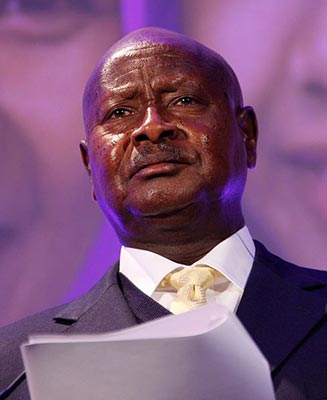HAS UGANDAN PRES REJECTED ANTI-GAY BILL?

President Yoweri Museveni
There are reports from Uganda that President Yoweri Museveni is not willing to sign the Anti-Homosexuality Bill that was passed by Parliament late last year, although he remains firmly bigoted when it comes to his views on homosexuality.
The Daily Monitor has published parts of a letter by Museveni to Parliament, dated 28 December 2013, in which he outlined his stance on the legislation and on homosexuality in general.
In it, Museveni, rejected the bill on two fronts. The first is on a technicality – the way that the pill was passed by the legislature – and the second is on how best to deal with gays and lesbians in Uganda.
He criticised Parliament’s Speaker Rebecca Kadaga for forcing through the bill, despite being advised that there were not sufficient MPs to do so.
It’s been claimed that Kadaga and a group of anti-gay MPs conspired to pass the bill; keeping a plan to vote on it secret until the last minute, and rejecting protests by Prime Minister Amama Mbabazi that there were not enough lawmakers in attendance.
“How can you pass law without the quorum of Parliament after it has been pointed out? What sort of Parliament is this? How can Parliament be the one to break the Constitution and the Law repeatedly?” Museveni asked.
He then went on to argue that homosexuality is an abnormality and that its causes should be treated rather than further criminalised.
“The question at the core of the debate of homosexuality is; what do we do with an abnormal person? Do we kill him/her? Do we imprison him/her? Or we do contain him/her?” Museveni asked.
“You cannot call an abnormality an alternative orientation. It could be that the Western societies, on account of random breeding, have generated many abnormal people,” he said.
In addition to arguing that homosexuality is an abnormality, he also re-stated the widely held belief in Africa that people can be “lured” into becoming gay or lesbian.
Museveni claimed that some youth become gay for “mercenary reasons,” recruited through financial incentives. He also stated that in addition to “abnormal” lesbians, some women who are unable to get married simply turn to homosexuality because of “sexual starvation”.
He further argued that the way to “rescue” many of these recruited homosexual is to improve the economy of the country. He accused MPs of exposing the youth to homosexuality by not approving government projects to create jobs.
“Even with legislation, they will simply go underground and continue practising homosexuality or lesbianism for mercenary reasons,” Museveni said.
He added that he would, however, support legislation jailing for life anyone who lures “normal” youth into “these disgusting behaviours”.
Museveni stated that the caucus of his ruling party, the National Resistance Movement (NRM), would come to a “scientifically correct” position on the Anti-Homosexuality Bill.
If the bill is returned to Parliament by Museveni and the NRM Caucus, it could still be made into law by Parliament without his consent, but it is unclear if there would be enough support from MPs to do this without the backing of the government.
The Anti-Homosexuality Bill punishes aggravated homosexuality with life imprisonment. In addition, anyone who “aids, abets [or] counsels” any gay person and anyone who rents a home or room to a gay person could also be sentenced to seven years in jail.
The bill further includes criminal penalties of three to seven years in prison for anyone who fails to turn over gay people to the police or anyone who “promotes” homosexuality.
He has rejected it on the grounds that parliament “did not have a quorum”